

15 cambios que nos hicieron humanos - BBC Mundo. Científicos afirman que Dios produjo el Big Bang. La ciencia y la religión han mantenido un antiguo debate casi interminable sobre la creación del universo, pero esta semana el conflicto entre el creacionismo y el Big Bang, podría haber ganado un importante capítulo.

El Profesor Nathan Aviezer, de la Universidad Bar Ilan de Israel, dijo que la ciencia y religión puede vivir juntas y en armonía. Tras el lanzamiento de su libro “En el principio” [In the Beginning], dijo que los científicos están buscando desde hace décadas las ondas producidas por la gravedad, pero esto ha sido una hazaña difícil. Early Spanish Hunter-Gatherer Was Dark and Blue-Eyed. The first whole human genome from the bones of a southern European who lived before farming shows he was blue eyed, dark skinned, lactose intolerant and well equipped to fight diseases.
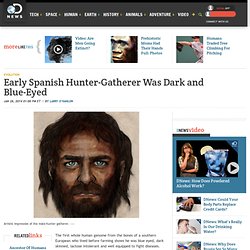
The discoveries about the 7,000-year-old Mesolithic ancestral European suggest the young man represents a transition that was still underway to create the lighter-skinned, milk-drinking people of more recent millenniums. The genome of what's called the La Braña individual appears to have already acquired immunities to diseases that were thought to have been introduced to humans later, at the time when Europeans domesticated animals, which are thought to have transmitted the diseases to humans.
The results were a surprise to the researchers who fully expected the man would have lighter skin and a more ancient set of immunity alleles, or groups of genes. Milk Drinking Still a Mystery Other researchers agree that the precocious immunity of the La Braña individual is especially intriguing. El vicio de fumar, ¿es culpa del hombre de Neandertal? - BBC Mundo - Noticias. La vida en la Tierra vino de Marte, argumentan los científicos. La reconocida Conferencia Internacional de Goldschmidt para Geoquímicos, en Florencia, Italia, atrajo la atención por lo inusual que fue.
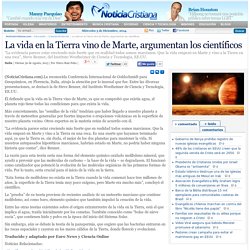
Entre las diversas presentaciones, se destacó la de Steve Benner, del Instituto Westheimer de Ciencia y Tecnología, EE.UU. Mice can inherit learned sensitivity to a smell. 2-Dec-2013 [ Print | E-mail ] Share [ Close Window ] Contact: Quinn Eastmanqeastma@emory.edu 404-727-7829Emory Health Sciences Trauma can scar people so indelibly that their children are affected.
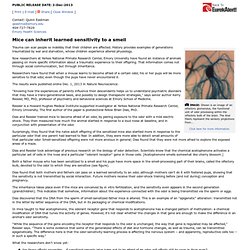
History provides examples of generations traumatized by war and starvation, whose children experience altered physiology. Now researchers at Yerkes National Primate Research Center, Emory University have found an instance of animals passing on more specific information about a traumatic experience to their offspring. Por qué las primeras huellas del Big Bang son un hito extraordinario - BBC Mundo - Noticias. Rock around the clock: zircon crystal is oldest piece of Earth. WASHINGTON — To put it mildly, this is one gem of a gem.
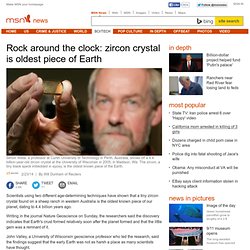
Scientists using two different age-determining techniques have shown that a tiny zircon crystal found on a sheep ranch in western Australia is the oldest known piece of our planet, dating to 4.4 billion years ago. Writing in the journal Nature Geoscience on Sunday, the researchers said the discovery indicates that Earth's crust formed relatively soon after the planet formed and that the little gem was a remnant of it. John Valley, a University of Wisconsin geoscience professor who led the research, said the findings suggest that the early Earth was not as harsh a place as many scientists have thought. To determine the age of the zircon fragment, the scientists first used a widely accepted dating technique based on determining the radioactive decay of uranium to lead in a mineral sample. "One of the things that we're really interested in is: when did the Earth first become habitable for life?
Schimpansen können fremde Sprache lernen - SPIEGEL ONLINE. Je nach Leckerei, die sie entdecken, stoßen Schimpansen unterschiedliche Laute aus.

Bislang gingen Forscher davon aus, dass der Klang der Rufe vom Geschmack der Affen abhängt: Je begeisterter und aufgeregter ein Schimpanse von einem Nahrungsmittel ist, desto schriller der Schrei. Nun aber zeigt sich, dass die Primaten gezielt kommunizieren und sogar fremde Affensprachen lernen können. Neue Lautsprache nach Umzug Zwischen 2010 und 2013 haben Katie Slocombe von der University of York und Kollegen die Apfel-Rufe von 13 Schimpansen im Zoo von Edinburgh untersucht.
Sieben von ihnen waren zuvor aus einem Safari-Park in den Niederlanden nach Schottland gezogen. Nach drei Jahren Zusammenleben sah das deutlich anders aus. "Es ist sehr leicht zu hören, wie unterschiedlich die Gruppen 2010 nach Äpfeln riefen und wie die niederländischen Individuen ihre Rufe bis 2013 angepasst haben", erklärt Stuart Watson, ebenfalls von der Universität of York. The truth about Darwin and God. Thus, whatever “Darwinism” is, this is not a book about Darwinism.
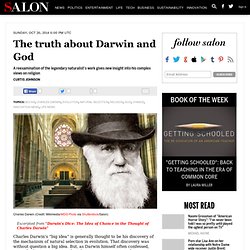
Nor is it a book about contemporary evolutionary theory or the “new synthesis” or the “extended synthesis.” It is rather a book about “chance” in Darwin’s writing. To that extent it must confront “Darwinism” more broadly, even in its recent and contemporary incarnations, if only to situate the problems it deals with in a proper context. But an answer to “what is Darwinism” is surprisingly elusive. Even if we grant that “Darwinism is whatever Darwin said it is,” the problems of identifying Darwinism only begin there.
To mention only the most notorious example, the Origin of Species, from its first appearance in 1859 through the last edition (sixth, 1872) underwent revisions, many of decided significance, for each new edition. My view is that “Darwinism” had a single meaning to Darwin from beginning to end. In the case of Darwin such evidence is hard to come by. Darwinism.